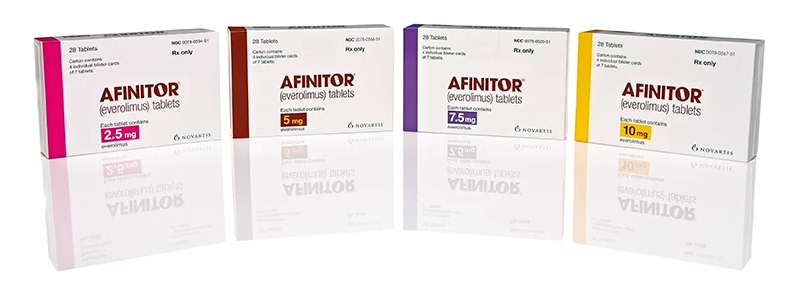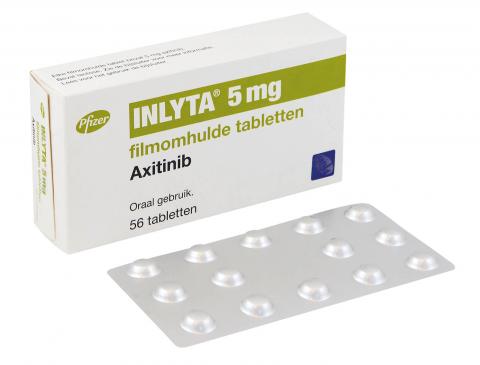Afinitor (everolimus) vs Inlyta (axitinib)
Afinitor (everolimus) vs Inlyta (axitinib)
Afinitor (everolimus) and Inlyta (axitinib) are both targeted therapies used to treat certain types of cancer, but they work in different ways. Afinitor is an mTOR inhibitor that can slow the growth of cancer cells and is often used for advanced renal cell carcinoma, as well as certain types of breast and pancreatic neuroendocrine tumors. In contrast, Inlyta is a tyrosine kinase inhibitor that specifically targets the vascular endothelial growth factor (VEGF) pathway, which can inhibit the growth of blood vessels that supply the tumor, and is primarily used in the treatment of advanced renal cell carcinoma. Patients should consult with their healthcare provider to determine which medication is most appropriate for their specific condition, taking into account the type of cancer, stage, previous treatments, potential side effects, and overall health.
Difference between Afinitor and Inlyta
| Metric | Afinitor (everolimus) | Inlyta (axitinib) |
|---|---|---|
| Generic name | Everolimus | Axitinib |
| Indications | Advanced hormone receptor-positive, HER2-negative breast cancer; advanced neuroendocrine tumors; renal cell carcinoma; subependymal giant cell astrocytoma; tuberous sclerosis complex | Advanced renal cell carcinoma after failure of one prior systemic therapy |
| Mechanism of action | mTOR inhibitor | Tyrosine kinase inhibitor |
| Brand names | Afinitor, Zortress | Inlyta |
| Administrative route | Oral | Oral |
| Side effects | Mouth ulcers, infections, rash, fatigue, diarrhea, edema, abdominal pain | Diarrhea, hypertension, fatigue, decreased appetite, nausea, dysphonia, hand-foot syndrome |
| Contraindications | Hypersensitivity to everolimus or other rapamycin derivatives | Hypersensitivity to axitinib or any component of the formulation |
| Drug class | mTOR inhibitor | Tyrosine kinase inhibitor |
| Manufacturer | Novartis | Pfizer |
Efficacy
Efficacy of Afinitor (Everolimus) in Treating Kidney Cancer
Afinitor (everolimus) is a medication that has been approved for the treatment of advanced renal cell carcinoma (RCC), which is the most common type of kidney cancer. The efficacy of Afinitor in treating kidney cancer has been demonstrated in several clinical trials. Everolimus works by inhibiting the mammalian target of rapamycin (mTOR), a protein that plays a critical role in the growth and proliferation of cancer cells. By targeting this pathway, Afinitor can slow the progression of the disease and has been shown to be beneficial for patients who have failed previous treatment with other targeted therapies such as sunitinib or sorafenib.
In a pivotal Phase III trial known as the RECORD-1 (REnal Cell cancer treatment with Oral RAD001 given Daily) study, patients treated with Afinitor showed a significant extension in progression-free survival compared to placebo. This study provided strong evidence supporting the use of Afinitor for patients with metastatic RCC who have progressed on VEGF-targeted therapy. The drug has been found to be particularly effective in patients with clear cell histology, which is the most common histological subtype of kidney cancer.
Efficacy of Inlyta (Axitinib) in Treating Kidney Cancer
Inlyta (axitinib) is another targeted therapy approved for the treatment of advanced renal cell carcinoma after failure of one prior systemic therapy. Axitinib is a potent and selective second-generation inhibitor of vascular endothelial growth factor receptors (VEGFRs), which are implicated in the angiogenesis process that supplies blood to the tumor, thereby allowing it to grow and spread. By inhibiting these receptors, Inlyta can effectively reduce tumor blood supply and inhibit tumor growth.
The efficacy of Inlyta in kidney cancer has been established through various clinical trials, including the pivotal Phase III AXIS trial, which compared axitinib to sorafenib in patients with advanced RCC who had failed one prior therapy. The results indicated that axitinib significantly improved progression-free survival compared to sorafenib. Additionally, some patients treated with axitinib have shown objective responses, including partial and complete responses, indicating a reduction in tumor size. Inlyta is generally considered a standard treatment option for second-line therapy in patients with advanced RCC.
Regulatory Agency Approvals
Afinitor
-
European Medical Agency (EMA), European Union

-
Food and Drug Administration (FDA), USA

-
Health Canada

-
Pharmaceuticals and Medical Devices Agency (PMDA), Japan

-
Therapeutic Goods Administration (TGA), Australia

Inlyta
-
European Medical Agency (EMA), European Union

-
Food and Drug Administration (FDA), USA

Access Afinitor or Inlyta today
If Afinitor or Inlyta are not approved or available in your country (e.g. due to supply issues), you can access them via Everyone.org.
How it works

Make an enquiry
Choose the medicine you want to buy, answer a couple of questions, and upload your prescription to speed things up. We’ll get back to you within 24 hours.


Make an enquiry
Choose the medicine you want to buy, answer a couple of questions, and upload your prescription to speed things up. We’ll get back to you within 24 hours.


Breeze through the paperwork
We'll guide you through the required documents for importing unapproved medicine, ensuring you have all the necessary information.


Get a personalized quote
We’ll prepare a quote for you, including medicine costs and any shipping, administrative, or import fees that may apply.


Receive your medicine
Accept the quote and we’ll handle the rest - sourcing and safely delivering your medicine.

Some text on this page has been automatically generated. Speak to your physician before you start a new treatment or medication.
Let's talk
If you have any questions, call us or send us a message through WhatsApp or email:
Contact us




